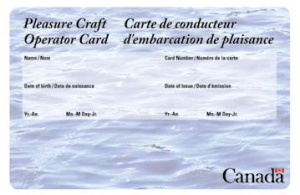2021-Jun-02
Modernizing Pleasure Craft Operator Competency Program (PCOCP) Regulations
 Last summer saw a COVID-inspired surge in boating interest and as a result, a huge increase in the number of Pleasure Craft Operator Cards (PCOCs) issued:
Last summer saw a COVID-inspired surge in boating interest and as a result, a huge increase in the number of Pleasure Craft Operator Cards (PCOCs) issued:
- 2020: 237,810 PCOCs issued to September 2020
- 2019: 142,000 PCOCs issued
- 2014 to 2019 Average: 153,000 PCOCs issued annually
Transport Canada is proposing a modernization of the current Pleasure Card Operator Competency Program (PCOCP) regulations, which develops and maintains the the regulations, polices and guidelines related to the operator competency requirements for recreational boaters. This move will strengthen the accreditation process and recover most of the costs associated with providing accreditation.
The main changes involve:
- the addition of age restrictions for young boaters to align with other regulatory programs
- the strengthening of accreditation requirements and fees for course providers
- the improved powers for TC to penalize course providers for non-compliance and to cancel a PCOC
A cheat sheet detailing the proposed changes can be found here:
Proposed Small Vessel Licensing Regulations
 In addition to the PCOCP changes above, Transport Canada is also looking to modernize the Pleasure Craft License (PCL), the unique license number used to identify vessels, to build a more comprehensive and accurate database for emergency situations, law enforcement and identifying owners of wrecked or abandoned vessels.
In addition to the PCOCP changes above, Transport Canada is also looking to modernize the Pleasure Craft License (PCL), the unique license number used to identify vessels, to build a more comprehensive and accurate database for emergency situations, law enforcement and identifying owners of wrecked or abandoned vessels.
Proposed changes include:
- current lifetime and 10-year licenses would move to a five-year term
- a $15 service fee for acquiring a new PCL, renewing and transferring an existing PCL
- transfer of sale notification requirements
- the improved power for TC to cancel a PCL for non-compliance
A cheat sheet detailing the proposed changes can be found here:
Like any regulation change, all these improvements must go through the Canada Gazette l Publication (feedback stage) estimated in later fall 2021 or winter 2022 and Canada Gazette ll (notification of impending changes), with the changes expected to be in place by the fall of 2022.
